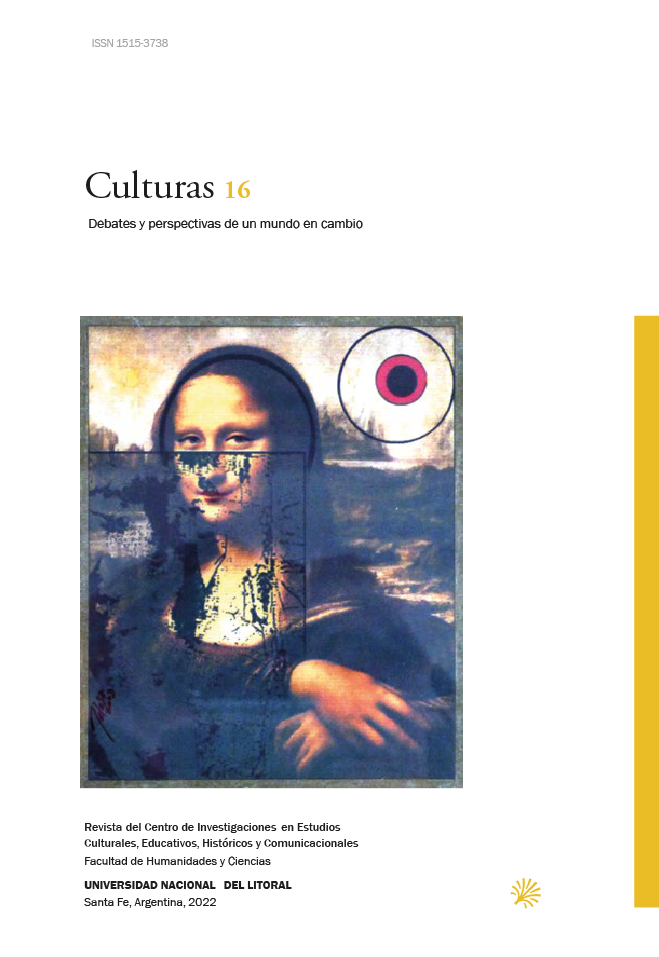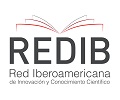Appropriation of a common good in the Andes society and its resistance. «Agua», by José María Arguedas
DOI:
https://doi.org/10.14409/culturas.2022.16.e0002Keywords:
Andes, common good, water crisis, gamonalism, environmental humanities, indigenousAbstract
In a world scenario of water crisis, in the so–called Anthropocene or better, Capitalocene, this article carries out a «close reading» of «Agua» (1935), the first story published by José María Arguedas. In an Andean area, the gamonal denies water to the indigenous community members desperate for the need for irrigation and gives it to his favourites, for which a fragile and violently crushed resistance is born. The water crisis is contextualized with a historical look at the Andean collective works originating in pre–Inca times, the collapse of the Tawantisuyo due to the European invasion and the dispossession and proprietor policies of the republican period that turned water from a common good into a commodity managed by the gamonales in exchange for the consolidation of their domination. The story is narrated by a child who is an autobiographical shadow of the author. The supportive and sorrowful Ernesto witnesses the suffering and also the indigenous culture and worldview. The value of symbols is analyzed, highlighting the leading role of Nature: water and sun. Questioning Mario Vargas Llosa's criticism of Argueda's work, it is pointed out that the story prepares for the confrontation of situations, such as the current one, in which scarcity of water reaches dramatic levels and where its nature as a common good is fundamental. The ability of the text to promote a hope that invigorates resistance to climate disaster and attempts at individualistic solutions over collective interests is also underlined.
References
Acosta, J. (1987) [1590]. Historia natural y moral de las Indias. (Edición de José Alcina Franch). Madrid: Historia 16.
Arguedas, J.M. (1957). Los ríos profundos. Buenos Aires: Losada.
Arguedas, J. M. (1964). Todas las sangres. Buenos Aires: Losada.
Arguedas, J. M. (1968a). «El problema de la expresión literaria en el Perú» en Yawar Fiesta. Santiago de Chile: Editorial Universitaria, S.A.
Arguedas, J. M. (1968b). «No soy un aculturado». Discurso al recibir el Premio Inca Garcilaso de la Vega, Lima, octubre de 1968 [en línea] Consultado el 18 de agosto de 2022
Arguedas, J. M. (1971). El zorro de arriba y el zorro de abajo. Buenos Aires: Losada.
Arguedas, J. M. (1974). Relatos completos. Buenos Aires: Losada.
Asociación De Academias de la Lengua Española. Diccionario de americanismos. «Misti». [en línea] Consultado el 26 de noviembre de 2021 https://www.asale.org/damer/misti
Assies, W. (2003). «David versus Goliath in Cochabamba: Water Rights, Neoliberalism, and the Revival of Social Protest in Bolivia.» Latin American Perspectives, 14–36.
Borja, R. (2019). «Gamonalismo» en Enciclopedia de la Política. [En línea]. Consultado el 24 de julio de 2021. http://www.enciclopediadelapolitica.org/gamonalismo/
Buell, L. (1995). The Environmental Imagination: Thoreau, Nature Writing, and the Formation of American Culture. London: Princenton UniversityPress
Carson, R. (2007). El mar que nos rodea. Traducción de Ruben Landa revisada por Lluis Rovira Rey. Barcelona: Destino.
Cieza de León, P. (1973) [1552]. El señorío de los incas. Lima: Editorial Universo.
Chevallier, J. y Gheerbrant, A. (1986). Diccionario de los símbolos. Barcelona: Ariel.
Cirlot, J. E. (1991). Diccionario de símbolos. Barcelona: Labor.
Cornejo Polar, A. (1994). Escribir en el aire. Ensayos sobre la heterogeneidad socio–cultural en las literaturas andinas. Lima: Editorial Horizonte.
Crutzen, P J. y Stoermer, E.F. (2000). The Anthropocene, IGBP [International Geosphere–Biosphere Programme] Newsletter, n° 41:17–18.
Fabre, H. (1975). Los incas. Barcelona: Oikos–Tau.
Fox Lockert, L. (1992). «La conciencia social andina en la obra de José María Arguedas», Actas del X Congreso de la Asociación Internacional de Hispanistas, Publicadas por Antonio Vilanova, Barcelona: Promociones y Publicaciones Universitarias, 601–609.
Garrard, G. (2004). Ecocriticism. New York, NY: Routledge.
Greimas, A. J. y Courtes, J. (1979). Sémiotique: dictionnaire raisonné de la théorie du langage. Paris: Hachette.
Guttal, S. (2017). El derecho a los (bienes) comunes. Boletín del World Rainforest Movement Nº 234. [En línea]. Consultado el 15 de octubre de 2021
https://wrm.org.uy/articles–from–the–wrm–bulletin/the–right–to–common/
Ibarra, D. (2020). Las guerras por el agua, la predicción que se hace realidad. Cambio16. [en línea]. Consultado el 23 de enero de 2021 https://www.cambio16.com/las–guerras–por–el–agua–la–prediccion–que–se–hace–realidad/ .
Lafforgue, J. (1974). «Nota a esta edición» en Arguedas, 223–238.
Mcwhinney, J. E. Water: The Ultimate Commodity. Investopedia. 24 May 2013. [en línea]. Consultado el 17 de julio de 2021
http://www.investopedia.com/articles/06/water.asp#ixzz3dFAPuPNS
Merchant, C. (1989). The Death of Nature. Women, Ecology, and the Scientific Revolution. New York: 1989.
Moore, J. W. (editor). Anthropocene or Capitalocene? Nature, History, and the Crisis of Capitalism. Oakland, CA: PM Press, 2016.
Murra, J. V. (1978). La organización económica del Estado inca. México, D.F.: Ediciones Siglo XXI.
Remedi, G. «Muros como mares (problemas de lenguaje)». (Manuscrito).
Oviedo, J. M. (1992). «José María Arguedas» en Antología crítica del cuento hispanoamericano del siglo XX. Madrid: Alianza, 77–82.
Santa Sede. Discurso del Santo Padre Francisco a los participantes en el Seminario «Derecho Humano al Agua» organizado por la Pontificia Academia de las Ciencias [en línea] Consultado el 10 de setiembre de 2021. https://www.vatican.va/content/francesco/es/speeches/2017/february/documents/papa–francesco_20170224_workshop–acqua.html
Sengupta, S y Cai, W. A Quarter of Humanity Faces Looming Water Crises. New York Times, [en línea] Consultado el 6 de agosto de 2021
https://www.nytimes.com/interactive/2019/08/06/climate/world–water–stress.html
Vargas Llosa, M. (1996). La utopía arcaica. José María Arguedas y las ficciones del indigenismo. Fondo de Cultura Económica, México.
Waldau, P. (2013). Animal Studies: An Introduction. Oxford, UK: Oxford University Press.






